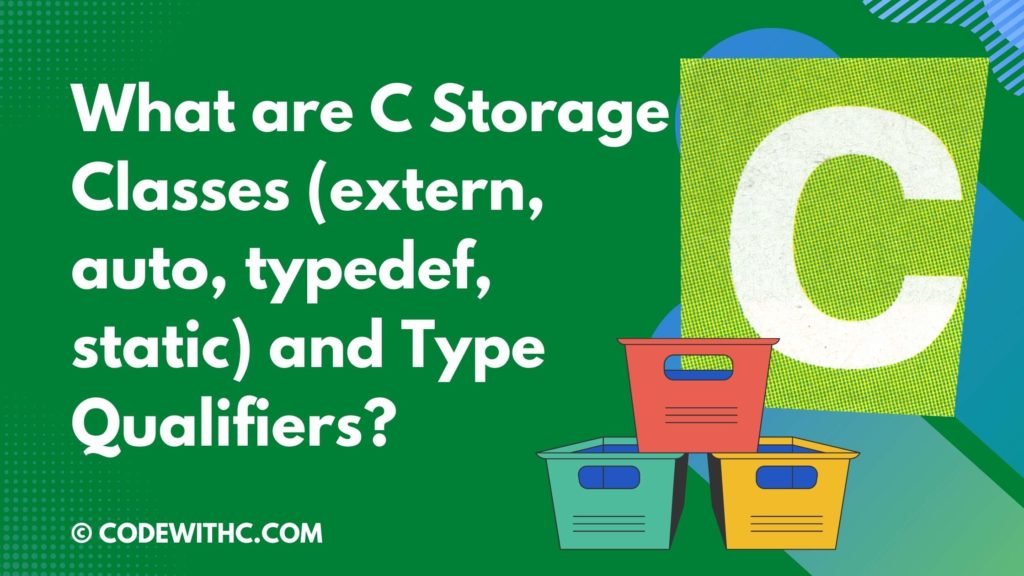What are C Storage Classes (extern, auto, typedef, static) and Type Qualifiers?
You might have heard the term storage class, but if you don’t know about it then here I will explain you what is it?
If you are a beginner in programming then you should know that storage classes and type qualifiers play an important role in C programming. Storage classes and type qualifiers are the essential features of C language. Let’s talk about what these two terms are and how they are used in C programming.
What Are Storage Classes and Type Qualifiers?
Storage class and type qualifier are the essential features of C programming. They are the characteristics of variables and structures that helps us to manage the memory allocation. The storage classes help to allocate the memory dynamically. In addition, we use the storage classes and type qualifiers for data types.

Why Do We Need C Storage Classes?
There are two main uses of C storage classes. The first is to specify the type of data to be used and the second one is to specify the name of the variable.
Storage Class Identify the Type of Data
The storage class specifies the type of data to be used in a variable. When you use storage classes to identify the type of data, you need to specify the type of data to be used in the variable. It is used to specify the type of data to be used.
For example, the int is a primitive type. The long is a long integer type, double is a floating point number and char is a character. In the following example, we are defining the type of data to be used in the variable. The storage class specifies the name of the variable. It is used to specify the name of the variable. You can use the following storage classes to identify the variable.
int myVar = 2;
We have assigned the value of 2 to the variable myVar. Now, it is a integer.
There are many types of classes that exists in C, and each type has its own specific purpose. The most common ones are the following:
Static class: Static classes are used to declare variables that will be visible to the entire application, but the variables of static class will be initialized when the program starts. The main advantage of static class is that it will make your code safer because it will be less likely to create unwanted memory issues.
Auto class: Auto classes are also called as variable class, these variables will be created when the compiler is generating the code for the class. This is the next type of storage class and it is also the default storage class.
The compiler allocates the memory dynamically and it will allocate the memory as and when it is required.
Extern class: These classes are used to declare variables that are defined outside of the current file, and the variables of this class will be initialized when the program starts. The main advantage of this type of class is that you will be able to use the variables of this class in other files.
It is used to declare the variables that are not in the same file. We will use the extern keyword in the header file.
Typedef class: Typedef class is used to declare the name of a data type as a variable.
This is the third type of storage class and it is also known as the alias storage class. Using the typedef keyword, you can define a new name for an existing type.
So, these are the basics of storage classes and type qualifiers in C programming. If you are a beginner, then these storage classes and type qualifiers will help you to make your life simpler.
How to use extern, auto, typedef and static in C programming?
Here is an example of how to use extern, auto, typedef and static in C programming:
Example 1:
//Declaring a variable of type int
int x;
//Extern storage class
int y = 10;
//Auto storage class
float z = 2.5f;
//Typedef storage class
typedef struct{
int a;
char b[20];
}sample;
//Static storage class
sample s = {1, "test"};
Example 2:
//Declaring a variable of type char
char a;
//Extern storage class
char b = 'a';
//Auto storage class
char c = 'b';
//Typedef storage class
typedef struct{
int a;
char b[20];
}
sample2;
//Static storage class
sample3 s = {1, "test"};
Conclusion:
So, this was the brief explanation of storage classes. If you have any doubts, then you can ask it to me in the comment section below.







